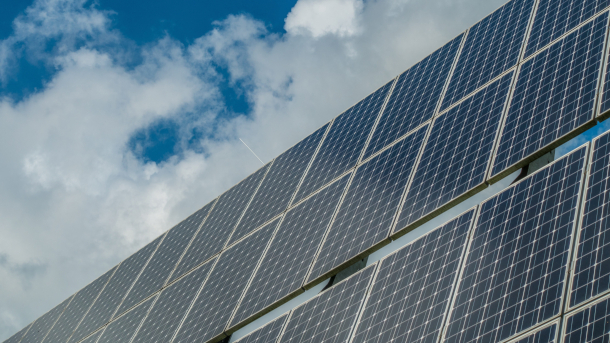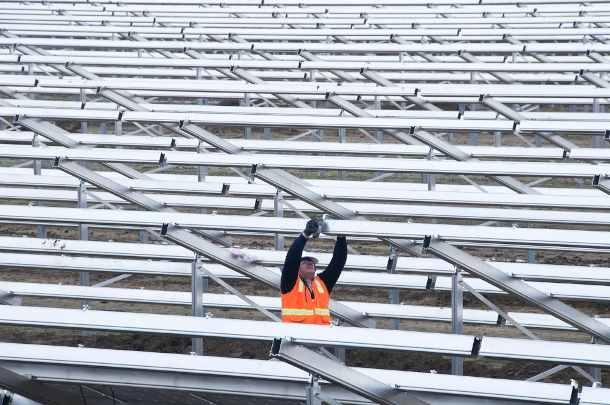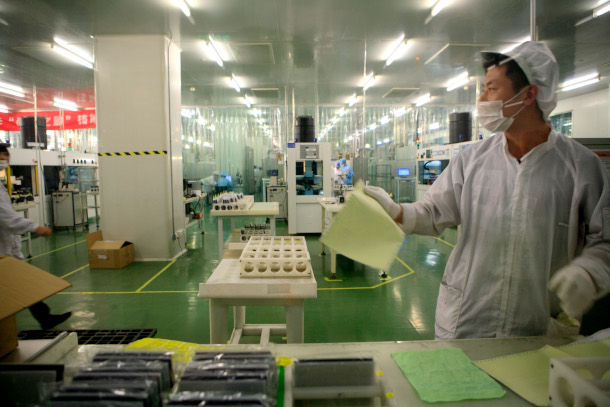Shutdowns in the Solar Industry
Air Date: Week of April 8, 2022

SOLV Energy’s main projects can produce 200 Megawatts of energy, around the equivalent yield of a small coal plant. (Photo: Piqsels, public domain)
Much of the US solar energy installation business has been frozen suddenly in its tracks by a U.S. Department of Commerce investigation into whether China is evading tariffs on solar cells and panels. So at a time when there is more demand than ever for solar power, the U.S. solar installation industry is now experiencing project delays, layoffs, and uncertainty. Host Steve Curwood talks to Abigail Hopper, CEO of the Solar Energy Industries Association and George Hershman, CEO of SOLV Energy, about the chilling effect and consequences of these tariffs and the investigation.
Transcript
DOERING: From PRX and the Jennifer and Ted Stanley Studios at the University of Massachusetts Boston, this is Living on Earth. I’m Jenni Doering.
CURWOOD: And I’m Steve Curwood.
The US solar energy installation business has been frozen suddenly in its tracks by a complaint to the US Department of Commerce that China is evading tariffs on solar cells and panels. At the same time there is more demand for solar power, as the war in Ukraine disrupts fossil fuel supplies and climate change worsens. Back in 2011 the Commerce Department did find that China was selling solar panels to the US at prices below the cost of manufacture, a practice known as dumping. China backed off of the subsidies involved, but then in 2018 the Trump administration-imposed tariffs on Chinese solar panels as part of a larger trade war. And on April first the Commerce Department began an investigation into charges Chinese companies are circumventing these tariffs by completing manufacturing in Southeast Asian countries. With possible retroactive penalties for imports, the U.S. solar industry is already seeing project delays. The vast majority of solar panels now come from Asia. And experts say even at warp speed it would take at least two years before enough panels could be made in the US to meet President Biden’s goal of using domestic manufacturing to drive clean energy growth. Abigail Hopper is CEO and President of the Solar Energy Industries Association. I asked her to comment on the complaint that Chinese companies are somehow bypassing US tariffs.
HOPPER: The claims that are being made is that Chinese companies are getting around US trade law by putting manufacturing facilities in countries other than China. It is our strong belief and our legal position that that is not what is happening. But that is the crux of the investigation.
CURWOOD: As I understand some folks say, well, Chinese companies are having folks in Vietnam or Malaysia or other places in Southeast Asia, do the final assembly or maybe even just stick the label on before it gets shipped to the United States. How fair is that characterization?
HOPPER: Yeah, I think it's a very unfair characterization of what's happening. There is significant and major manufacturing processes. And I use those words very intentionally, because those are the words in the statute. So there are some raw materials coming out of China. But the vast majority of the value of the product is being produced in countries like Vietnam, Thailand, Malaysia, and then they're being shipped to United States. It is a perfectly permissible way in which our goods enter the United States.

One utility-scale solar power project can employ 300-400 people, Hershman says. With the delays produced by the investigation, not only are existing workers being laid off—new workers aren’t being hired, most of whom would come from rural areas. (Photo: Oregon Department of Transportation, Flickr, CC BY 2.0)
CURWOOD: To what extent is this a new practice of China completing the manufacturing of products in other Southeast Asian countries?
HOPPER: You know, this isn't really a new practice, there have been tariffs on cells and modules coming out of China since the early 2010s. It's one thing if you're good, you figured out a smarter way, a more efficient way to manufacture a product, that's competition. But if your government gives you unfair advantage, then that's not fair competition. And that's what the Department of Commerce found in the early 2010s. What has happened in the ensuing period is that some companies have made investments in other countries in Southeast Asia, choosing to invest in other countries is what happens all the time around the world. You know, I'm holding an iPhone in my hand as we're talking. I have a dress on. There's a global marketplace that we're talking about. And these companies are abiding by the laws we have set and this investigation threatens to have a detrimental impact on our industry.
CURWOOD: Abigail Hopper is CEO of the Solar Energy Industries Association. For a view from the frontlines of the US solar industry, we called George Hershman, CEO of SOLV Energy, which builds utility scale solar power stations.
HERSHMAN: The consequences for this are extremely dire for the industry. Currently, about 80% of the modules that are used in the US installations come from the countries that have been named in this petition. So currently, we have really no access to modules, module manufacturers are not delivering to the US, which is essentially frozen the market today. You know, to date, we are either shifting employees to projects that currently have modules to install, you know, we're going to see layoffs in the next 30 or 60 days, if we continue down this path. The number that often doesn't get counted is the amount of new hires that we won't be making. A typical project for us is about 200 megawatts, we'll hire somewhere between three and 400 people, most of our projects are in rural areas, if a project is delayed, we are not hiring three or 400 people.
CURWOOD: Now, what is the demand for photovoltaic solar arrays in this country? And to what extent can US manufacturers meet that demand.
HERSHMAN: So there is a massive demand for renewables in all sectors. So there's really three distinct parts of the industry. There's a residential sector that is putting panels on rooftops, and there's a massive demand because of energy challenges due to natural disaster or wildfire. There's a commercial sector, that's the areas that serve corporate offices, schools, municipal buildings. And then a sector that we specialize in, which is the utility sector, which is the largest part of the industry and has huge demand in almost all states of the kind of lower 48 now are dealing with the need for renewables. Solar has been the lowest cost of energy generation for a number of years in a number of areas, the US capacity currently just doesn't meet probably 10% of the overall demand. And most of the product that is built here, services, the residential and commercial sector, our product just doesn't exist in the US. So it's not like we can go buy enough product to build one of our projects, let alone 30 projects that we have under construction. Now, obviously, the hope is that through true industrial policy, something like the manufacturing tax credits that we see within what was Build Back Better, and hopefully will come back in some form of at least a renewable energy bill. And we look forward to that, we want to buy us product, it just currently doesn't exist today.

China is the largest manufacturer of solar panels in the world. The U.S. imports 80% of its solar equipment from Chinese manufacturing companies. (Photo: Jiri Rezac, Climate Group, Flickr, CC BY-NC-SA 2.0)
CURWOOD: To what extent does protectionism around solar reflect the interests of the fossil fuel industry?
HERSHMAN: Well, clearly anything that slows down the adoption of renewables continues to support the use of fossil fuels. And we should be doing everything we can to expand deployment, and we have an administration that is supportive of that, at least in their words. Unfortunately, what we've seen is a continuation of a previous administration's tariffs and this new action that has really countered to the administration's goals.
CURWOOD: In your view, what does President Biden need to do to get serious about the climate at least visa-à-vis the production of solar power?
HERSHMAN: Well, I hope that President Biden recognizes that we need to support US industry. Unfortunately, there are certain companies that are using the tariff laws to their advantage and essentially weaponizing them for their own gain. The administration needs to recognize that you can't let small fringe players up end the entire agenda. And so I'm hoping that the administration will review this case quickly. There is no reason to take the required 150 days, they can recognize that there is no new information in this petition that's already been determined in previous ABC VD cases and throw it out quickly.
CURWOOD: George Hershman is the chief executive of SOLV Energy. Thank you so much for taking the time with us today.
HERSHMAN: Oh, thank you for having me. I really appreciate it.
CURWOOD: We reached out for comment to the US Department of Commerce as well as the office of the US Trade Representative in the White House, but neither office responded before our production deadline.
Links
Living on Earth wants to hear from you!
Living on Earth
62 Calef Highway, Suite 212
Lee, NH 03861
Telephone: 617-287-4121
E-mail: comments@loe.org
Newsletter [Click here]
Donate to Living on Earth!
Living on Earth is an independent media program and relies entirely on contributions from listeners and institutions supporting public service. Please donate now to preserve an independent environmental voice.
NewsletterLiving on Earth offers a weekly delivery of the show's rundown to your mailbox. Sign up for our newsletter today!
 Sailors For The Sea: Be the change you want to sea.
Sailors For The Sea: Be the change you want to sea.
 The Grantham Foundation for the Protection of the Environment: Committed to protecting and improving the health of the global environment.
The Grantham Foundation for the Protection of the Environment: Committed to protecting and improving the health of the global environment.
 Contribute to Living on Earth and receive, as our gift to you, an archival print of one of Mark Seth Lender's extraordinary wildlife photographs. Follow the link to see Mark's current collection of photographs.
Contribute to Living on Earth and receive, as our gift to you, an archival print of one of Mark Seth Lender's extraordinary wildlife photographs. Follow the link to see Mark's current collection of photographs.
 Buy a signed copy of Mark Seth Lender's book Smeagull the Seagull & support Living on Earth
Buy a signed copy of Mark Seth Lender's book Smeagull the Seagull & support Living on Earth

